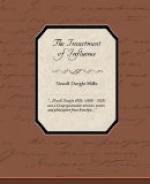THE GENTLENESS OF TRUE GIANTHOOD.
“A gentleman’s first characteristic is that fineness of structure in the body which renders it capable of the most delicate sensation; and of structure in the mind which renders it capable of the most delicate sympathies—one may say, simply ‘fineness of nature.’ This is, of course, compatible with heroic bodily strength and mental firmness, in fact, heroic strength is not conceivable without such delicacy. Elephantine strength may drive its way through a forest and feel no touch of the boughs, but the white skin of Homer’s Atrides would have felt a bent rose leaf, yet subdue its feeling in glow of battle, and behave itself like iron. I do not mean to call an elephant a vulgar animal, but if you think about him carefully you will find that his non-vulgarity consists in such gentleness as is possible to elephantine nature, not in his insensitive hide, nor in his clumsy foot, but in the way he will lift his foot if a child lies in his way and in his sensitive trunk, and still more sensitive mind, and capability of pique on points of honor. Hence it will follow that one of the probable signs of high-breeding in men generally will be their kindness and mercifulness.”—Modern Painters.
CHAPTER IX.
THE GENTLENESS OF TRUE GIANTHOOD.




